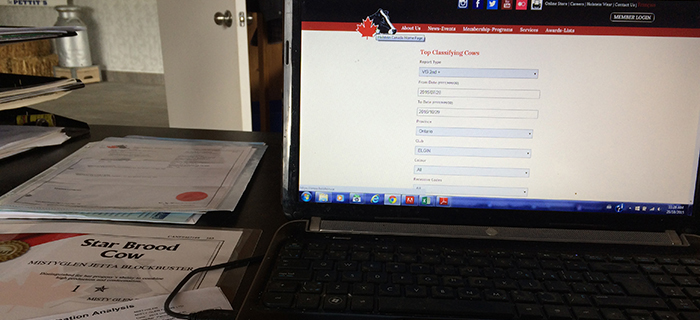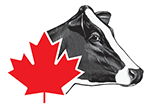Proper Record-Keeping - Upholding Herdbook Integrity
Ensuring the integrity of the Herdbook is a responsibility Holstein Canada takes seriously as it ensures the integrity of not only our Association but reflects the reliability of the entire Canadian dairy industry. Holstein Canada is the sole provider of purebred animal registrations as outlined under the Canadian Animal Pedigree Act, which the Association has belonged to since 1901.
It is the duty of each member registering cattle in the herdbook to make and retain for a minimum period of fifteen (15) years, in a record system, a complete and consecutive record showing date, name and number of every animal served, the name and number of the sire used, and the date of calving, ear tag number and sex of calf.
Rule of Thumb: An acceptable herd record-keeping system should be up-to-date and designed so any person designated by Holstein Canada could drop in unannounced and confidently identify and prepare applications for all unregistered calves, and/or confirm lineage details of previously registered animals.
Ensuring thorough, consistent yet simple records is valuable to both the member and the Association as these records can be used for many purposes including DNA discrepancies that may arise. With more members using online electronic services to register animals, ensuring hard copy records are kept on-farm is also very important in proper record-keeping.
Helpful Tips for Excellent Record Keeping On-Farm
- Ensure simple but consistent and complete information is kept for the required time period of 15 years.
- The six basic pieces of information to document in your records are: Ear tag number of calf, sex of calf, dam, sire, breeding date, and birth date of animal.
- Keeping hardcopy pedigree certificates is a good idea but ensuring the accompanying breeding document is even more important and required by Association By-laws.
- AI breeding calendars are very useful in tracking breeding information and collecting the appropriate information for accurate record-keeping.
- Tagging of animals must be done within the first day of birth as the Association has an obligation under the Canadian Animal Pedigree Act and the By-laws to have animals properly identified and tagged.
Ensure you Report all Breeding Information
Producers are ultimately held responsible for the submission of all
registration details, both for calvings and services/breedings. This system
allows for a measure of flexibility from herd to herd and accommodates
natural breeding, on-farm inseminations by owners and third party
inseminations by AI-accredited personnel.
All service information/breeding slips related to the service of an animal
that would potentially result in the birth of a calf to be registered must
be included with each application for registry or transfer of ownership as
the case may be. In order to execute the normal Herdbook edits at the time
of registration of a resulting calf, by the owner at the time of birth, all
potential services/sires should be reported. In a general sense, 92% of all
registrations result from AI services and with a 60% - 65% conception rate.
Semen from the first service sire is not always used and/or available for
repeat services.
When technician-generated AI breeding slips accompany applications for registry, the last two services are inclusive, which is the standard. The reporting of on-farm service information can be brief, but it should include at least the last two services, particularly so when semen from two different bulls has been used within a month/30day period. Please note that the reporting requirement by producers applies in like manner to AI services by technicians and owners.
When completing applications for registry please ensure that all breeding information related to the service of an animal that would potentially result in the birth of the calf to be registered is included with each application for registry or transfer of ownership, as the case may be.
Herd Visits
Herd audits/ visits are a way Holstein Canada officials can ensure members are abiding by the requirements set out in the Association By-laws. Visits not only allow officials to ensure requirements are being met, but also allow for open and honest conversation between officials and members on ways record-keeping can be enhanced.
Any Holstein Canada member should be comfortable in hosting a herd visit as these visits are a perfect way to showcase comprehensive records while providing an opportunity to have an honest conversation with Holstein Canada officials.

